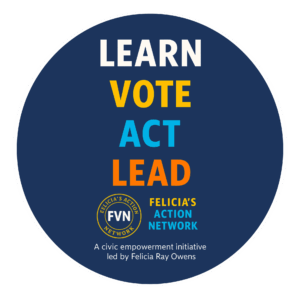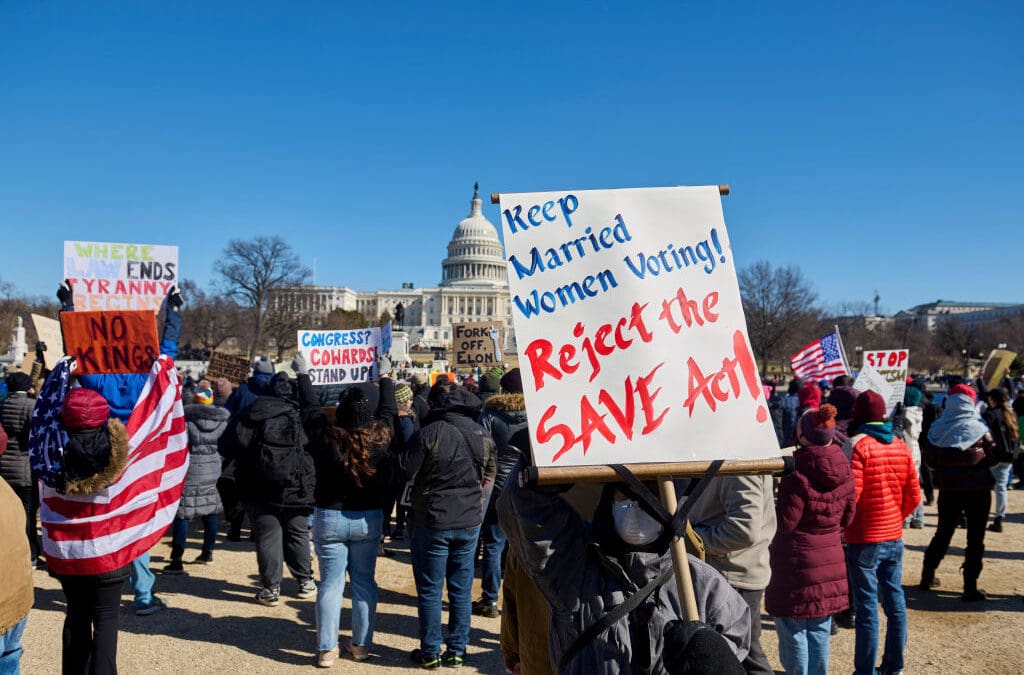
Free Press Defenders Rip Marjorie Taylor Greene’s ‘Bullsh*t’ Attack on Public Broadcasters | Common Dreams
March 26, 2025
More than three years after fatal on-set shooting, the ‘Rust’ trailer is out
March 26, 2025A dangerous attack on voting rights comes amidst critical local elections in 2025.
Shirley Chisholm said, “If they don’t give you a seat at the table, bring a folding chair.” I carry these words with me every day, along with the awareness that if they try to take your seat, it means that they are intimidated by your power. And it’s our responsibility to fight to keep it—like my grandmother, Doris Sheafe, who, at age 23 in 1937 (before all Black women had the right to vote) made her voice heard and testified before Congress about the American Youth Act.
Now, in 2025, we are spending Women’s History Month not only celebrating our power but also fighting for it as we honor the women who paved the way.
Women—especially Black women—are still fighting for equal rights and opportunities in the U.S. Meanwhile, members of Congress are threatening to undermine the hard-fought, fundamental right to vote for all Americans, including millions of women, under the guise of misleading allegations of voter fraud. And they’re ironically calling it the Safeguard American Voter Eligibility (SAVE) Act.
Make no mistake: The SAVE Act is not going to “save” anything. This legislation would create unnecessary barriers to registering to vote in every state. It would require all voters to provide proof of citizenship documents in person when registering to vote or updating their registration—provisions that effectively end online, automatic and mail-in voter registration. Women who change their name after marriage or divorce would face unnecessary barriers to registering to vote.
Hoping your birth certificate will be sufficient proof of citizenship? Think again, because as many as 69 million married women do not have a birth certificate matching their legal name, and as many as 3.3 million eligible trans voters face the same barrier.
How about your passport? The reality is that more than 140 million American citizens, including 56 percent of Black Americans, do not have a passport, a document that also requires a legal name.

Millions of us do not have these documents readily accessible. But under the SAVE Act, if women can’t provide these documents, they can’t register to vote.
Congress has tried this before: The House passed the SAVE Act previously in July 2024, but it later stalled in the Senate. This time, members of Congress are trying to fast-track the bill, meaning it could go directly to the House floor for a vote any day now.
The SAVE Act’s disproportionate impact on women voters is not a coincidence, it is voter suppression.
We already know how this will shake out: Under a similar state law in New Hampshire, women faced challenges casting their ballots earlier this month, from having to make three trips to their polling locations to bring the specific documentation needed, to waiting hours because a voter’s name on her birth certificate did not match her surname after getting married and divorced.
This national bill will have far-reaching implications across gender, race and income. Only one in five citizens with an income below $50,000 have a valid passport. Black women in America continue to experience higher poverty rates than both their white counterparts and men. In the lead up to the 2024 election, more than half of Black women voters worried about affording groceries, household utilities and healthcare, and nearly half worried about affording their rent or mortgage. With the SAVE Act, the same women who are most impacted by the economy, inflation and wages would face daunting obstacles to voting.
Would you drive four and a half hours to show your citizenship documents at an election office? That’s a commute some of the 60 million Americans living in rural areas may make—a logistical trial for women who may need to arrange childcare and time off work.
To add to the difficulty with voter registration, first-time young male voters report year after year feeling more qualified and ready to vote than their female counterparts say they do.
It’s no coincidence we’re seeing this nationwide legislation during a year with over 100,000 local elections taking place across the country. But women are a powerful force in our democracy, and we continue to make our voices heard no matter what—because our absence from the ballot box will be taken as our consent for the fundamental freedoms they’re trying to take away.
The never-ending news cycle and continuous attacks on our voting rights are exhausting, but women have good reason to stay engaged: Every time we vote, we change this country. Community-building and local elections are critical ways to use our power in 2025. Women must show up in this year’s local elections, especially as federal support may be limited.
From deciding local education policy for more than 100 million Americans through school board members, to electing more than 5,000 mayors and 30,000 city council members, we have the opportunity to protect our classrooms and make decisions about housing, abortion access and LGBTQ+ rights in our neighborhoods this year.
Additionally, in a post-Roe reality where the courts have more say on women’s reproductive healthcare than ever before, more than 1,000 judges are on ballots across the country this year, including critical state supreme court races in Pennsylvania and Wisconsin.
Women’s rights are always on the ballot, and the SAVE Act is a targeted effort to silence voters with the potential to impact millions of women. Right now is the time to call our U.S. senators and tell them to vote no on this dangerous bill. With so much at stake, it is more important than ever for us to check and update our voter registration to make sure we stand ready to decide the future of our communities and protect our democracy in 2025.
Great Job Beth Lynk & the Team @ Ms. Magazine Source link for sharing this story.








